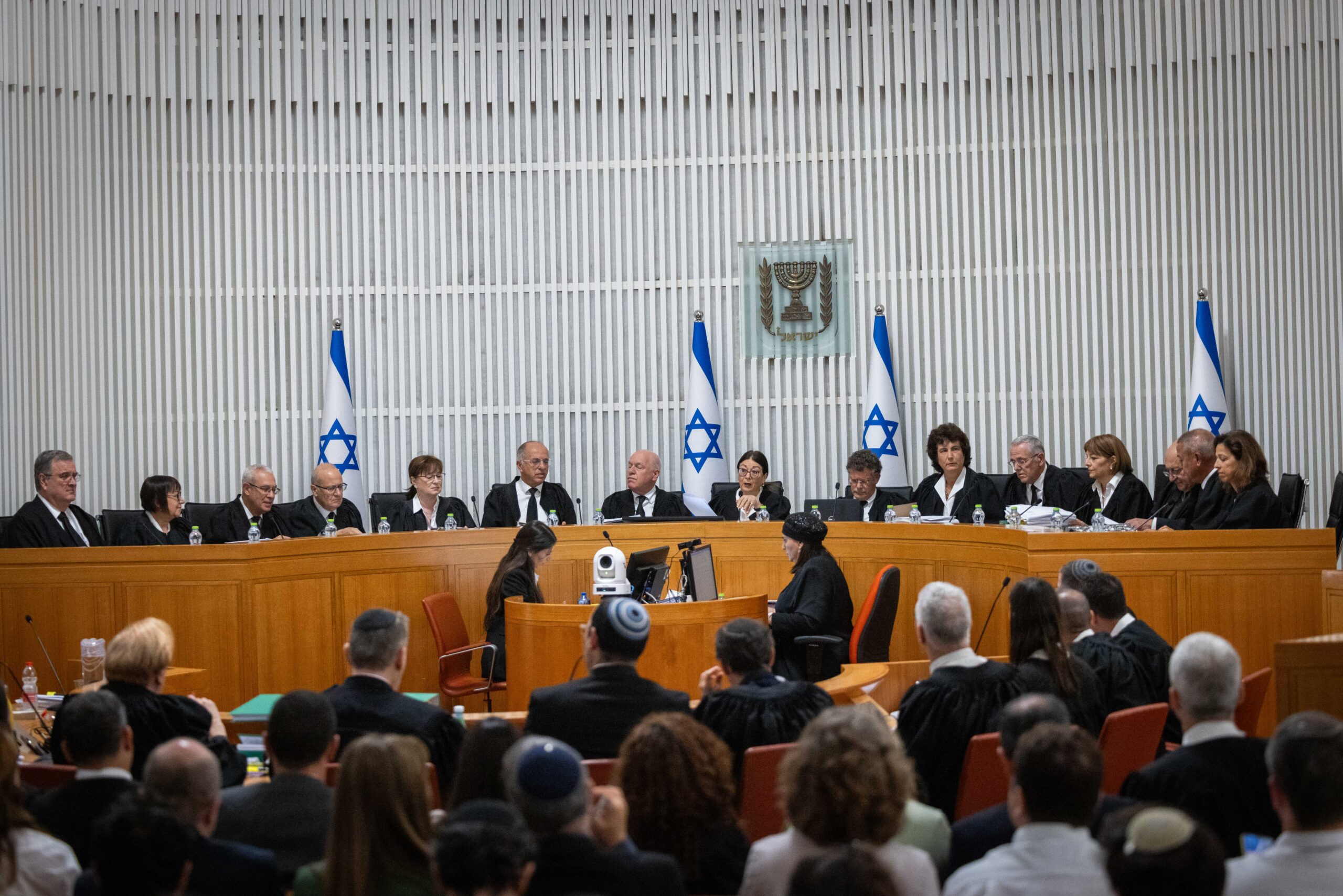
President of the Supreme Court Esther Hayut and Supreme Court Justices at a court hearing on petitions against the government’s “Reasonableness Bill”, at the Supreme Court in Jerusalem, September 12, 2023. Photo by Yonatan Sindel/Flash90
Prof. Sam Lehman-Wilzig: Judicial Activism in Jewish History and Law
Once again “Judicial Reform” (or: Judicial Revolution) is on the government’s legislative agenda – notwithstanding the continuing war in Gaza and Lebanon.
Before Oct. 7, 2023, Israel was convulsed by a huge domestic controversy: the Right-wing government’s attempts to limit the authority of the Supreme Court through various types of legislation. The reason: the ruling parties felt that the court was ostensibly too activist (“liberal”) in its judgments, overruling various government policies and edicts. For the “reformers,” the Court needed a healthy dose of judicial self-restraint – and as it wasn’t going to restrain itself, the government would have to do so.
It’s possible to easily view this as an oxymoronic position: a conservative government using radical legislation to overturn traditional Supreme Court practice! Compounding such a legislative contradiction is the fact that it’s being pushed by the religious parties who view the Court as a bulwark against settlement expansion and religion-related legislation. Thus, the question arises (for the Jewish State): what does the Jewish tradition – especially the Bible – have to say about a “liberal” approach to legislation, judicial and otherwise?
One can start with the basic – and very surprising – fact that in the entire Torah (5 Books of Moses) there is absolutely no mention of human writing! Indeed, the only mention of “writing” relates to God “writing” the Ten Commandments. Other than that, every type of commandment and legislation is oral e.g., Moses reading the commandments out loud to the Children of Israel at Mount Sinai (in Exodus) or orating to the Israelites (the entire book of Devarim – Deuteronomy).
Indeed, the first mention in the whole Bible of a written Torah appears in the 6th century BCE (King Josiah) – six hundred years after Mount Sinai!! And even then, it’s only Deuteronomy that was “discovered” in the Temple. In short, the Torah was transmitted orally from one generation to the next for many centuries before it was written down. Further proof of its essential orality comes two centuries later, when Ezra the Scribe gathers the Jews who stayed in Israel along with those who had returned from Babylon – and declaims out loud “The Law” to them in a va’yak’hel (gathering the people together for a public reading).
Why is this relevant to the issue of judicial/legislative “activism”? Because as scholars of communications and/or the law understand, any “Oral Law” by its very nature will be more malleable (open to interpretation and change) than Written Law. Indeed, even the Ten Commandments in Deuteronomy exhibits changes from the text in Exodus; over a mere 40 years between the two, Moses is already emending the text!
Today (and for the past 2000 years) we have been reading the written Torah, so it’s possible to get the impression that Judaism is based on the more “conservative” scripted law, but that’s a complete misunderstanding of the situation. Not only was (is) the Torah itself an oral-based law, but the halakha (from the root “to walk forward”) – the actual basis of Jewish religious practice – is itself Oral Law incarnate! Enter any ultra-Orthodox yeshiva and you’ll find none of the students are studying the Bible, but rather the Talmud exclusively – an oral law compendium largely comprising discussions and arguments between the Rabbis of yesteryear.
And what is the result of all this orality? Profound differences between the halakha as practiced and what was spoken (later written) in the Torah. One would be hard-pressed to find many Torah commandments that haven’t been either expanded (kosher laws), minimized (death penalties), significantly changed (prayer), and even abolished outright (Jubilee Year) by the rabbis. Indeed, the Talmud (Mankhot 29) relates apocryphally the story of Moses who appears in the yeshiva of Rabbi Akiva (the great Jewish Law decisor), and sits in the rear, listening to Akiva’s lessons. After some time, Moses is intellectually exhausted because he doesn’t recognize the laws that Rabbi Akiva is expounding (!). However, Moses is comforted when a student’s query as to the origin of these laws is answered by Rabbi Akiva: “These laws are from Sinai.” In other words (pun intended), Akiva’s clear law changes are retroactively appropriated to Moses.
Were these Rabbis judges or legislators? Given the Jews’ lack of formal political authority under Roman rule, the question is technically not answerable. But the legal-judicial philosophy was clear: constant change of Jewish Law in light of changing conditions. Earlier in Jewish history, when the “Judges” were an official part of the ruling Three Crowns (Monarchy, Prophets/Priests, and Judiciary), they had great authority – even to the extent that the King had to seek the Judges’ (Sanhedrin’s) permission to initiate a “voluntary war” (not one out of immediate, necessary self-defense). In the modern world we call this a system of “Checks and Balances,” a main pillar of democracy.
In short, Israel’s religious sector and/or its Jewish value “conservatives” should be the ones especially attuned to the need for a strong, independent judiciary. As is stated in Deuteronomy 17, 9: “And you shall come before the judge in those days, and ask, and they will inform you of the law, and you shall do everything that they command from that place.”








